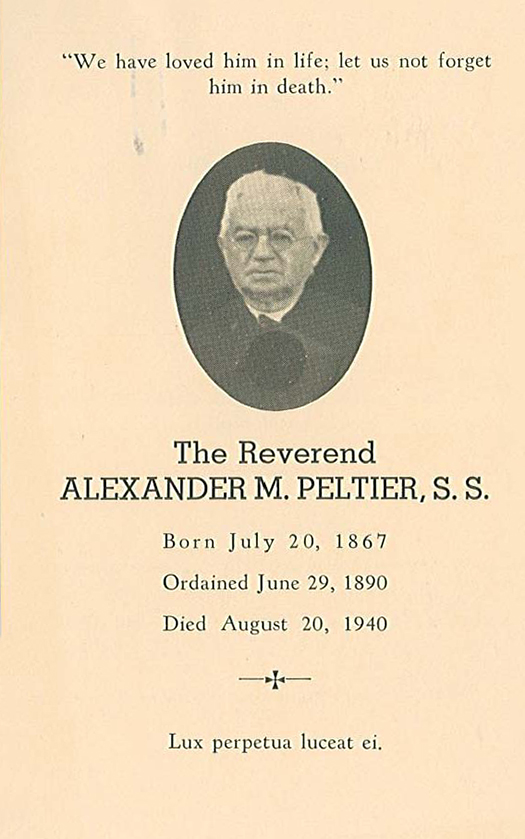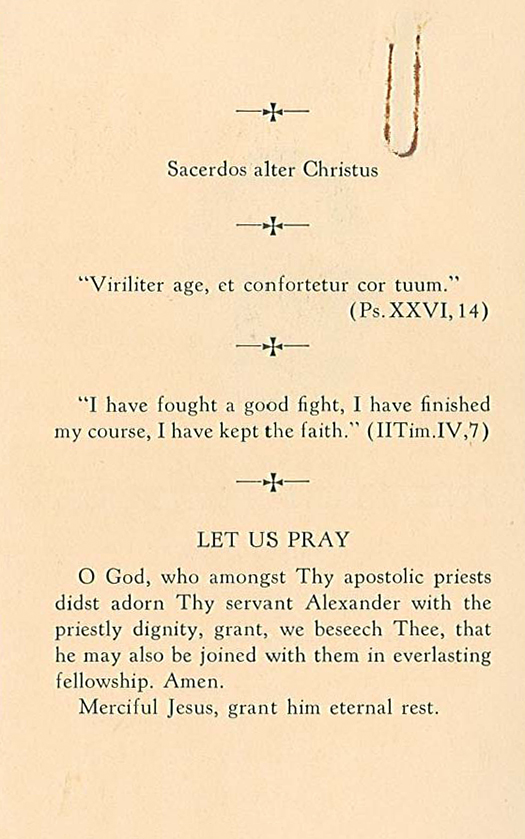Peltier, Father Alexander
1940, August 20
Date of Birth: 1867, July 20
Issy
December 21, 1941
Fathers and Dear Confreres:
Present circumstances have not permitted us to secure, on several of our deceased confreres, as much information as we might wish to have for giving to their death notices all desirable detail. However, as it is customary that their lives be gone over, we must pay our respects to their memory. Their life-stories, even incomplete, will be such as to edify the members of the Society. That is why I wish in this “collective biography” to call upon my own memory, and, thanks to that, to try to bring to life before you the likenesses of Fathers A. Bernard, Duchein, Peltier, W. McDonald, Guibert and Legrand, who lived and worked fruitfully in our provinces of Canada and the United States. . . .
† † †
Father Alexandre Peltier – like Father Duchein, although he exercised his ministry in America, – was a Frenchman of France. Alexandre Marie Peltier was born in the town of Batz in the Diocese of Nantes on July 20, 1867. We have no information about his childhood. But the place of his birth and the way his life developed permit us to suppose with good reason that his family was very religious, as is true generally of families in his diocese of origin, and that he thought naturally of becoming a priest in seeing how the priests who watched over his childhood lived and acted.
Very likely Alexandre Peltier made his secondary studies in the minor seminary of Guérande, near the town of Batz, his little home territory. In 1885 he entered the Seminary of Philosophy at Nantes, and in 1887, the Seminary of Theology. On June 29, 1890, he was ordained priest at Nantes. Since he had made known his desire to enter the Society of St. Sulpice, he came to Paris after his priestly ordination. From the Seminary of St. Sulpice where he put in his year of probation, Alexandre Peltier followed the courses at the Catholic Institute.
In 1891, he entered the Solitude. There he came across a young American confrere, Father Charles Gabriel Hogue of Cleveland, to whom he bound himself in friendship, whose colleague he was to become for a number of years, and who was to play an important role in the particular direction of his Sulpician life.
Anyway, it was in the vacation period of 1892, with Solitude over, that the Superior General sent Father Peltier to America. He himself said in his old age that at first he was destined for Canada. But Father Icard decided that Father Peltier would go to the United States. The decision was made even before he left France.
Over there our confrere spent his whole life and exercised his entire ministry in minor seminaries. His first assignment was to the minor seminary of St. Charles at Ellicott City. At the time he arrived in America, St. Charles was the only minor seminary in the United States. In that house which was established on property belonging to Charles Carroll of Carrollton, one of Washington’s companions during the Revolutionary War, and one of the signers of the Declaration of Independence, Father Peltier spent many years in educating in Latin and French future priests of the United States and more specifically of the eastern section of the country. Like all those who spent any time there, teachers and students, he loved it for its picturesque site, because of its nearness to the estate where the just-mentioned benefactor of St. Sulpice had lived, and also for the family atmosphere that prevailed there. For if that life has continued, it is because of its being transported elsewhere – to Catonsville – as a result of the tragedy which wiped out the minor seminary of St. Charles at Ellicott City. Father Peltier’s eyes must have filled with tears, like those of his confreres and students, on the day when fire raged in the old St. Charles and consumed the chapel, the main building, and the outbuildings with no possibility of the flames being overcome.
When Father Peltier’s appointment to St. Charles was at an end, our confrere was not long deterred from his ministry to boys and young men who were preparing to enter the major seminary. He loved this ministry. He was well equipped for it. Used to methods suited to secondary teaching, he would probably have had some trouble adjusting himself to teach in the major seminaries. So the Provincial Superior of the United States gave Father Peltier as his new field of action the minor seminary of San Francisco. This seminary, established first at Menlo Park to the south of San Francisco, was later transferred ten miles further south to Mountain View. Father Peltier was successively teacher in both places. He was treasured and loved there as he had been at St. Charles. It was there that he was to end his career.
When he was a little on in years, our confrere thought of returning to Europe. Feeling that he was no longer up on things, he was afraid that he was becoming a burden to his American colleagues. They had no such idea. Seeing them shower affection and regard on the old timer that Father Peltier had become, there could be no possible doubt of their attitude toward him. In any event, Father Peltier kept on working. For the boys and the young men of the west coast, he kept a normal teaching load. He admitted that he had become upset too quickly, that all the confreres were perfect for him, and that he would die in the United States.
His wish was to be fulfilled, but not as he foresaw. In June, 1935, Father Peltier asked the Provincial Superior of the United States for permission to come to France for the vacation period. This permission was graciously granted him. In the second half of June our confrere embarked at New York. He landed at Havre, spent some days in Paris, and happily got to his little home-territory of the town of Betz. Alas! The joy was short lived.
After a few weeks of vacation, Father Peltier was stricken with paralysis. For some time his family took care of him in the hope that the illness would let up; but it did not let up. Seeing that, they arranged to have him admitted to the Nursing Home of St. Paul of Pont Rousseau, run by the nuns of St. Anne of Saumur. There, Father Peltier had wonderful care. Among his visitors were the Bishop of Nantes; the Superior of the Major seminary, who showed him a fraternal concern, confreres from the diocese, etc.
One of his American colleagues, a fellow diocesan, Father Saupin, had come to France at the same time as he. He cabled Mountain View the sad news. The response did not take long in coming. Father Fenn, the Superior of St. Joseph’s, sent more than was necessary to make sure that the dear patient would have all the care he might need. He emphatically spelled out that Father Peltier was to return as soon as possible to Mountain View; that he was awaited there; that the Archbishop of San Francisco, his confreres, his former and present students wished to see him again and have him in the house. The poor patient was extremely moved by this invitation, so unanimous and cordial. It demonstrated how attached the American confreres were to him. But it presented to his conscience a vexing problem. “If I return to Mountain View,” he said, “I shall be very well received by everyone – I’m sure of that – but with my infirmity I shall inconvenience everyone. For it is more than likely that I would not be of any help, and that I would be much in need of help.” His inner voice caused him to be hesitant. The hypothesis of return to the United States supposed something of a cure for Father Peltier. It could hardly be thought prudent to allow a paralytic to undertake, even accompanied, a trip so long!
Beyond that, it was necessary to be sure of not doing anything unwise in sending back – even to a community which sincerely desired his return – a sick man all but incapable of doing anything helpful. In this matter the most honest of motivation was called for. With this in mind, an American confrere who was travelling in France was asked – and begged to speak freely: “But,” he replied, “there is no doubt about it. Father Peltier has to return to Mountain View. He is the soul of the house, the watchdog of tradition, the link between past and present. When a former student comes back, the first question he asks is ‘Where is Father Peltier? How is Father Peltier?” Don’t be uneasy. Just looking forward to his being there, everybody will be happy. He ‘will help’ just by being there!”
It was then decided that Father Peltier would return to Mountain View as soon as he was in condition to travel. In the spring of 1939 he left, accompanied by an American confrere. On his arrival in New York, he knew that he was expected in Baltimore; everyone there was anxious to see him again. From Baltimore he went to Catonsville, which is not far from there. There, at the minor seminary of St. Charles where he had labored so long, he rested a few weeks before undertaking the trip across the United States. He was heartily welcomed there. It was like a holiday. His old students came to see him. He was happy about it and so were they. Finally came time for starting out on the long return journey. He went by way of a road he knew well, the shortest, the Union Pacific; and he reached San Francisco safely. Of course he was met. The trip from the metropolis of the West to Mountain View was a short one compared to the rest. Father Peltier, who was in good shape, made it with joy. And he was received with enthusiasm at St. Joseph’s, where everyone made him welcome with a cordiality which embarrassed the humble man.
We had all these details from Father Peltier himself. After his arrival on the shores of the Pacific, he wrote – as he had promised – to reassure us about his long trip, and to give us news of his health. When he wrote, everything was going well. A second letter was as rosy as the first. But probably a second attack of paralysis was bound to be not long in coming. And Father Peltier has returned to God. . . .
I recommend to your prayers the six confreres whose lives I have just outlined.
Please accept, Fathers and dear confreres, the expression of my fraternal affection in Our Lord.
P. Boisard
Vice-Superior General of St. Sulpice


